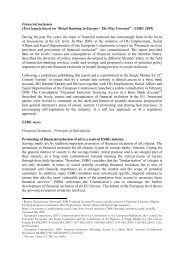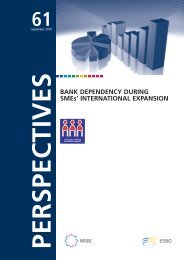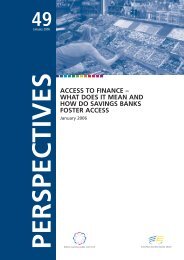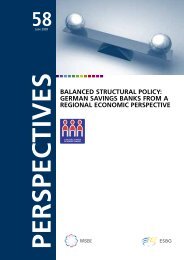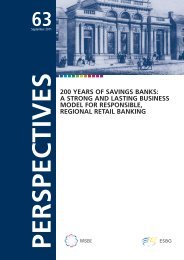A comparative analysis of the US and EU retail banking markets - Wsbi
A comparative analysis of the US and EU retail banking markets - Wsbi
A comparative analysis of the US and EU retail banking markets - Wsbi
Create successful ePaper yourself
Turn your PDF publications into a flip-book with our unique Google optimized e-Paper software.
Hermann Schulze-Delitzsch <strong>and</strong> Friedrich Wilhelm<br />
Raiffeisen created <strong>the</strong> first true credit unions in<br />
Germany in 1852 <strong>and</strong> 1864. In 1849, Raiffeisen<br />
founded a credit society in Flammersfeld, but it<br />
depended on <strong>the</strong> charity <strong>of</strong> wealthy men for its<br />
support. In 1864, Raiffeisen organised a new<br />
cooperative credit society along principles still<br />
fundamental today. Germany's credit societies <strong>and</strong><br />
similar institutions that Luigi Luzzatti founded in Italy<br />
were <strong>the</strong> forerunners <strong>of</strong> today's large cooperative<br />
banks in Europe.<br />
Cooperative banks account for about 8% <strong>of</strong> <strong>the</strong><br />
total <strong>banking</strong> market assets in Germany 98 , 16% in<br />
Finl<strong>and</strong> 99 , 19% in France 100 <strong>and</strong> 4% in Spain 101 .<br />
3.2.2.2.4.2 Ownership structure<br />
In general, a cooperative bank can adopt any o<strong>the</strong>r<br />
legal form which can be adapted to <strong>the</strong> above<br />
definition <strong>and</strong> characteristics. Accordingly, cooperatives<br />
can be incorporated under general company law<br />
<strong>and</strong> can take several company forms in a number <strong>of</strong><br />
European countries like Denmark, Germany or<br />
Luxembourg, but in <strong>the</strong> majority <strong>of</strong> states in <strong>the</strong> <strong>EU</strong><br />
cooperative banks are not only subject to <strong>the</strong> general<br />
law that applies to all credit institutions but also to<br />
laws governing cooperatives in general 102 . In several<br />
<strong>of</strong> those laws, <strong>the</strong>re is a special legal form <strong>of</strong> company<br />
foreseen for cooperatives 103 .<br />
3.2.2.2.4.3 Activities<br />
According to <strong>the</strong> universal <strong>banking</strong> principle in Europe,<br />
cooperative banks in general <strong>of</strong>fer a full range <strong>of</strong><br />
<strong>banking</strong> services just as commercial banks <strong>and</strong> savings<br />
banks do. Cooperative banks are in this respect <strong>of</strong>ten<br />
subject to <strong>the</strong> same legislation as o<strong>the</strong>r financial<br />
institutions. But as already mentioned above, a<br />
considerable number <strong>of</strong> cooperative banks in Europe<br />
are also subject to laws governing cooperatives in<br />
general or even special sector-based legislation<br />
for cooperatives 104 . Both kinds <strong>of</strong> laws may restrict<br />
<strong>the</strong> activities <strong>of</strong> cooperatives, mainly due to <strong>the</strong>ir<br />
mutual nature: historically, cooperatives were only<br />
allowed to carry out business with <strong>the</strong>ir members.<br />
However, in eight countries, where laws on<br />
cooperatives have been adopted recently (France,<br />
Italy, Spain, Belgium, Portugal, Denmark, Finl<strong>and</strong>,<br />
Sweden), third parties who are not members <strong>of</strong> a<br />
cooperative have been authorised to invest in it.<br />
When <strong>the</strong> exclusivity principle (under which cooperatives<br />
may have business relations only with <strong>the</strong>ir members)<br />
is enshrined in <strong>the</strong> legislation, it is usually couched in<br />
terms allowing for some flexibility. For example, many<br />
countries authorise transactions with third parties<br />
that are not members <strong>of</strong> <strong>the</strong> cooperative provided<br />
that <strong>the</strong>se transactions remain ancillary in nature <strong>and</strong><br />
do not jeopardise members’ interests. In several<br />
countries trade with non-members is tolerated, even if<br />
it runs contrary to <strong>the</strong> definition <strong>of</strong> a cooperative<br />
under national law. Certain Member States do not<br />
allow non-user (investor) members to benefit from<br />
surpluses resulting from trade with non-members.<br />
Cooperative banks have traditionally focussed on<br />
supplying financial services to rural communities <strong>and</strong><br />
also to small <strong>and</strong> medium-sized enterprises.<br />
Many cooperative banks also act in a socially responsible<br />
manner. First <strong>of</strong> all, <strong>the</strong>ir corporate structure is defined<br />
by <strong>the</strong> principles <strong>of</strong> democratic participation, <strong>the</strong> fair<br />
distribution <strong>of</strong> surpluses <strong>and</strong> solidarity. In addition,<br />
cooperative banks may also integrate o<strong>the</strong>r stakeholder<br />
interests <strong>and</strong> engage in respective projects, for<br />
example in <strong>the</strong> communities <strong>the</strong>y are located in.<br />
3.2.2.2.4.4 Taxation<br />
In Austria, Germany, Greece, Irel<strong>and</strong>, <strong>the</strong> Ne<strong>the</strong>rl<strong>and</strong>s<br />
<strong>and</strong> Luxembourg, cooperatives are subject to <strong>the</strong> same<br />
provisions <strong>and</strong> rates as o<strong>the</strong>r companies. However, in<br />
many <strong>EU</strong> Member States <strong>the</strong>re are special tax regimes<br />
for cooperatives which grant <strong>the</strong>m certain benefits.<br />
One common beneficial rule is a tax exemption /<br />
reduction for trade with members, but <strong>the</strong>re are also<br />
o<strong>the</strong>r specific provisions like withholding tax reductions<br />
<strong>of</strong> 25% for <strong>the</strong> first 125 Euros per annum invested<br />
per member, reduced rates <strong>of</strong> corporate tax for<br />
approved cooperatives (Belgium) or exemption from<br />
stamp duty on certain books <strong>and</strong> documents<br />
(Portugal). Those tax benefits basically result from<br />
<strong>the</strong> mutual nature <strong>of</strong> cooperatives.<br />
98 ESBG calculation on <strong>the</strong> basis <strong>of</strong> information from Deutsche Bundesbank.<br />
99 ESBG calculation on <strong>the</strong> basis <strong>of</strong> data from <strong>the</strong> OECD publication “Bank pr<strong>of</strong>itability” for 2003.<br />
100 ESBG calculation on <strong>the</strong> basis <strong>of</strong> data from <strong>the</strong> OECD publication “Bank pr<strong>of</strong>itability” for 2003. Note: In France savings banks have been organised as<br />
cooperatives since 1999. They are not however included in this calculation <strong>of</strong> market share.<br />
101 ESBG calculation on <strong>the</strong> basis <strong>of</strong> information from Banco de España (Boletín Estadístico).<br />
102 Exemptions are Denmark <strong>and</strong> Luxembourg.<br />
103 E.g. in Austria, Belgium, Italy, Irel<strong>and</strong>, <strong>the</strong> Ne<strong>the</strong>rl<strong>and</strong>s <strong>and</strong> Germany.<br />
104 E.g. Austria, France, Irel<strong>and</strong> (credit unions), Spain, Sweden, UK (credit unions <strong>and</strong> building societies).<br />
37



